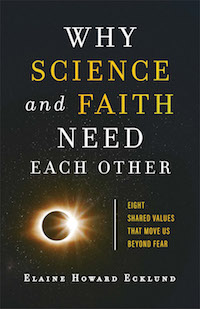
I love having statistics that show we don’t have to choose between science and faith. Two that I used this week in a talk include the nearly 55% of UK-based biologists and physicists surveyed who believe in a God, or the 61% of scientists (more broadly defined) surveyed in the US who believe in a God. I am grateful to Elaine Howard Ecklund and her team for their years of research that have produced these helpful figures. In her latest book, Elaine shares her perspective on where many people are in their thinking on science and faith – both in and outside of science – for a Christian audience, interwoven with stories from her own life. She brings a very helpful nuance to a conversation that can often be overwhelmingly polarized, and focuses on the shared values that science and Christian faith have in common. I think this will prove to be a very helpful, encouraging and practical book for many church leaders.
The pressures of being a researcher in the social sciences, which include applying for grants, teaching, mentoring, committee work, writing, and program management—alongside parenting, church work, and the ordinary inundations of modern living—make it hard for me to get to stillness. Here is one way I try: after I drop my daughter off at school in the morning, the first part of my prayer is my rendition of a phrase from Psalm 46:10…“Be still, and know that I am God.” I repeat the phrase “Let me be still and know that you are God” to myself as I walk to the university campus…Thoughts of what I need to get done in the work hours ahead and what I have left undone at home immediately assault me. “Let me be still . . .”…
Once I am on campus…I turn to the second part of my prayer: “Let me know that I am loved fully by God.” I pray this piece of the prayer because I often feel there are so many people to impress as part of my work—colleagues, students, funders, and reviewers, to name just a few—and the culture of academic science is pressure-filled, highly competitive, and at times cutthroat. I often feel too limited. “Let me know that I am fully loved,” that I have been created with everything I need in order to do what I need to do.
The last part of my walk takes me up several flights of stairs. With each step, I repeat the third part of my prayer: “Let me enter into what you are doing today.… remind myself that I am participating in what God is doing in the world. I do not solely work for myself, and my duty is beyond the self. I work for the academics I collaborate with and those who read my work. I work for the students I mentor and teach. I work for the public outside the university…I feel a responsibility to use my scientific work to accomplish something meaningful, improve social problems, and help people flourish.
In my interviews with Christian scientists, I have found that many of them feel similarly about their work and their goals, sometimes drawing on the concepts of shalom and stewardship. Shalom is a Hebrew word that comes from a root that means “completeness” and “perfection,” and it refers to the peace, harmony, well-being, and prosperity that result from the flourishing of all creation. Shalom can mean to get involved in the messiness of the world, to try to change structures that are not just, to try to make them more just…
Theologian Walter Brueggemann writes in The Prophetic Imagination, “Jesus in his solidarity with the marginal ones is moved to compassion. Compassion constitutes a radical form of criticism for it announces that the hurt is to be taken seriously, that the hurt is not to be accepted as normal and natural but is an abnormal and unacceptable condition for humanness. . . . Thus the compassion of Jesus is not to be understood as a personal emotional reaction but as a public criticism in which he dares to act upon his concern against the entire numbness of the social context.”…
My studies have found that many Christians in science also see their scientific work as a way to help create a more just and peaceful world, and they allow virtues and principles of their faith to affect how they use their science in the world. “Christian scientists are motivated to be justice-bringers,”…
Many of the Christian scientists I have surveyed and interviewed over the years view their scientific work as a calling and a way that they feel God’s pleasure and live out God’s purpose for them. This purpose is often seen as fulfilling their responsibilities as God’s stewards. Many also believe that viewing their scientific work through the lens of their Christian faith helps them see ways they can use their work toward shalom. I have met Christian scientists who have selected certain research areas or projects because they believe they will benefit society, create positive relationships with colleagues, or foster virtues like patience, kindness, and humility in the scientific community and in the broader society. I have spoken with Christian scientists who have specifically chosen work that will help alleviate poverty or suffering…
Some describe being divinely called to practice science. “I see all of the different parts of the scientific career as a calling, with the idea that vocation is God’s calling for your life,” said Jaime, a Christian evolutionary biologist we met earlier. “Our standards—as Christians—of scholarship are always intertwined with our standards for teaching and engaging students to uncover their own calling as well as to train them to be excellent scientists.”
“I definitely pray regularly. And I pray that the outcomes of my work would be meaningful and helpful to people,” said a Christian immunologist who works on very rare disorders that attack the disease-fighting systems in children’s bodies. “You know, I always ask for God’s best in my work.”…“I see science as an amazing tool to intervene on the human condition . . . where there’s suffering, where there are children who did not choose to have this immune deficiency and be in and out of the hospital. You know, we seek to understand and learn more about the science and biology, and drive at the root of the biology. [We want to] tweak the biology or transplant, so that child can have a meaningful, healthy life. And I look at that as a calling and a mission.”
One evangelical Christian biologist told me that he sees his work as “really much more of an integrated calling.” Echoing Chariots of Fire, he said, “God made me for this. To be a full Christian is to be fully what he has made me for, and he has made me for science.”
 Excerpts from Chapter 10 in Why Science and Faith Need Each Other by Elaine Howard Ecklund, ©2020. Used by permission of Baker Publishing www.bakerpublishinggroup.com
Excerpts from Chapter 10 in Why Science and Faith Need Each Other by Elaine Howard Ecklund, ©2020. Used by permission of Baker Publishing www.bakerpublishinggroup.com




